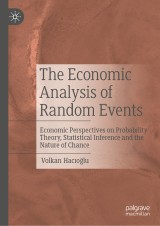Details
The Economic Analysis of Random Events
Economic Perspectives on Probability Theory, Statistical Inference and the Nature of Chance|
117,69 € |
|
| Verlag: | Palgrave Macmillan |
| Format: | |
| Veröffentl.: | 07.06.2024 |
| ISBN/EAN: | 9783031530784 |
| Sprache: | englisch |
| Anzahl Seiten: | 192 |
Dieses eBook enthält ein Wasserzeichen.
Beschreibungen
This book investigates applications of probability theory to random events from an economic standpoint and considers how economics can deal with uncertainty in today’s world. As such the nature of chance and probability will be discussed with examples taken from the theoretical literature in probability and the history of economic thought, as well as real-life events.<div><br></div><div>Chapters cover the nature of randomness and the element of chance, the concepts of both hidden costs and opportunity costs, the economic effect of human action, the randomness of economic events, random walk hypotheses and observable and unobservable phenomena. It situates the discussion in John Maynard Keynes’ and Ronald Fisher’s seminal works on probability, as well as introducing key tenets of probability theory and how these can be applied to economic events. The book considers the relationship between artificial intelligence and economic events, the role of big data, and international examples fromdifferent economic systems and how these can be evaluated. It also introduces a multidisciplinary exploration of other social sciences and how they deal with uncertainty, to assess the extent to which it is possible to apply probability theory to economic events which are by nature erratic and uncertain.<p>This book will be of interest to researchers and students in economics, statistics, and those in the social sciences interested in questions of randomness and chance. </p></div>
<div>1. Introduction.- 2. The True Nature of Randomness and the Element of Chance.- 3. Rethinking the Concept of (In)Opportunity Cost & Parable of Broken Window: A Reflection of Frederic Bastiat.- 4. The Economic Effect of Human Action in Relation to Artificial Intelligence.- 5. The Question of Conjecture in Economics and Probability: On the Applicability of Probability Theory to the Randomness of Economic Events.- 6. The Anatomy of Accident as a Deviation from Random Walk.- 7. Observable and Unobservable as Opposed to 'Seen and Unseen'.- 8. Conclusions.</div><div><br></div>
<b></b><b>Volkan Hacıoğlu</b> is an Associate Professor in the Faculty of Economics at Istanbul University. His research interests are in economic policy, economic theory, history of economic thought, statistical methods and economic growth.
This book investigates applications of probability theory to random events from an economic standpoint and considers how economics can deal with uncertainty in today’s world. As such the nature of chance and probability will be discussed with examples taken from the theoretical literature in probability and the history of economic thought, as well as real-life events. <div><br></div><div>Chapters cover the nature of randomness and the element of chance, the concepts of both hidden costs and opportunity costs, the economic effect of human action, the randomness of economic events, random walk hypotheses and observable and unobservable phenomena. It situates the discussion in John Maynard Keynes’ and Ronald Fisher’s seminal works on probability, as well as introducing key tenets of probability theory and how these can be applied to economic events. The book considers the relationship between artificial intelligence and economic events, the role of big data, and international examples from different economic systems and how these can be evaluated. It also introduces a multidisciplinary exploration of other social sciences and how they deal with uncertainty, to assess the extent to which it is possible to apply probability theory to economic events which are by nature erratic and uncertain.<div><p></p>
<p>This book will be of interest to researchers and students in economics, statistics, and those in the social sciences interested in questions of randomness and chance.<b></b></p>
<p><b>Volkan Hacıoğlu</b> is an Associate Professor in the Faculty of Economics at Istanbul University. His research interests are in economic policy, economic theory, history of economic thought, statistical methods and economic growth. </p></div></div>
<p>This book will be of interest to researchers and students in economics, statistics, and those in the social sciences interested in questions of randomness and chance.<b></b></p>
<p><b>Volkan Hacıoğlu</b> is an Associate Professor in the Faculty of Economics at Istanbul University. His research interests are in economic policy, economic theory, history of economic thought, statistical methods and economic growth. </p></div></div>
Introduces applied probability theory frameworks for economists and social scientists Explores the nature of artificial intelligence in relation to economic events Discusses the randomness of economic events and statistical methods for assessing uncertainty
Diese Produkte könnten Sie auch interessieren:

The Role of Non State development actors to economic development in ethiopis

von: Bortolina Habtamu

6,99 €
















